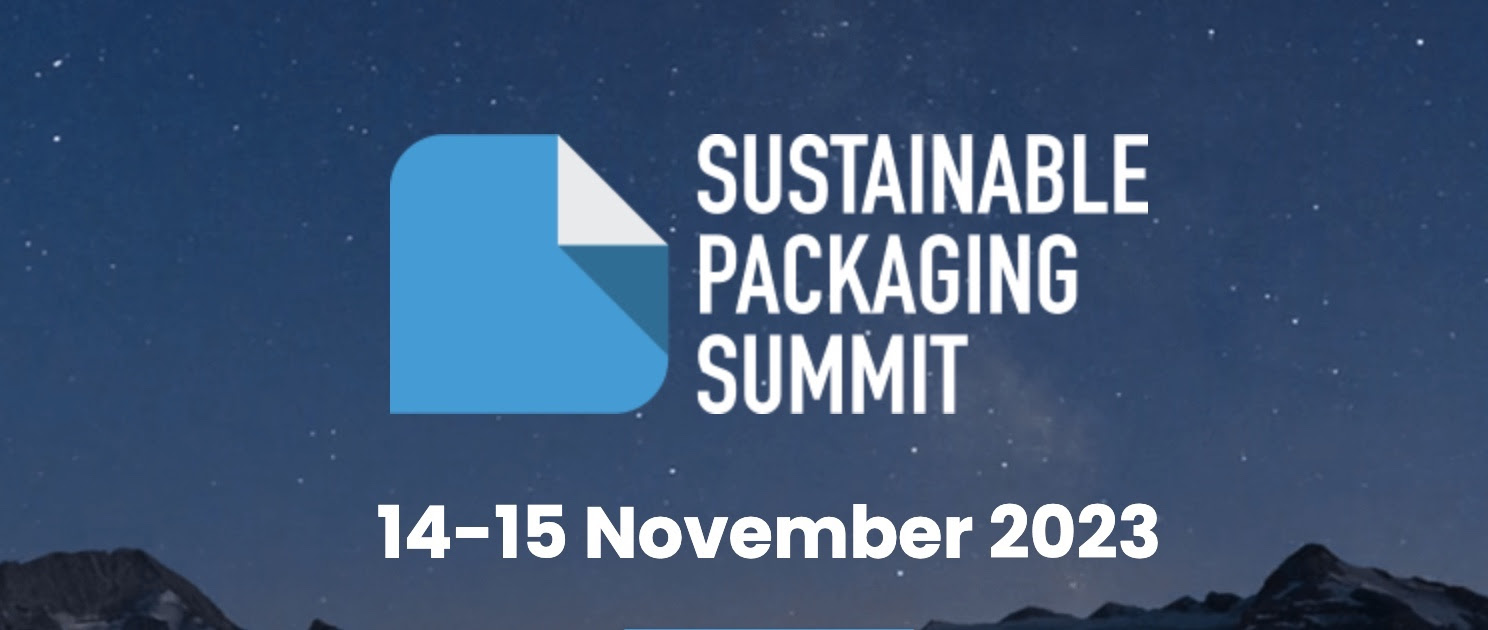
Taking place in Amsterdam on 14-15 November 2023, the Sustainable Packaging Summit will sharpen the focus on the demands and pain points revealed during last year’s ground-breaking series of discussions in Lisbon. The summit provides the platform for value chain leaders to frankly discuss strategic roadblocks and identify opportunities to align business, regulation and society around a circular, net zero packaging ecosystem.
Key topics on this year’s agenda:
Key topics on this year’s agenda:
- Critical review of sustainability goals and progress
- Net Zero strategies
- Regulation and its implications for our strategies: PPWR and the UN Treaty on Plastic (with live updates from Nairobi)
- Intercontinental dialogue on circular economy, learning from each other and harmonization
- EPR & unlocking investment
- Innovation Horizon: keys to a successful R&D strategy
- Start-up pitches
- Sustainable substrates: renewables, future plastics and infinite materials
- Digital transformation: driving sustainability by bringing together the connected factory and the digital consumer
- Scaling up reuse and refill models
- Chemical recycling & mass balance
- Hear directly from the key value chain platforms and associations
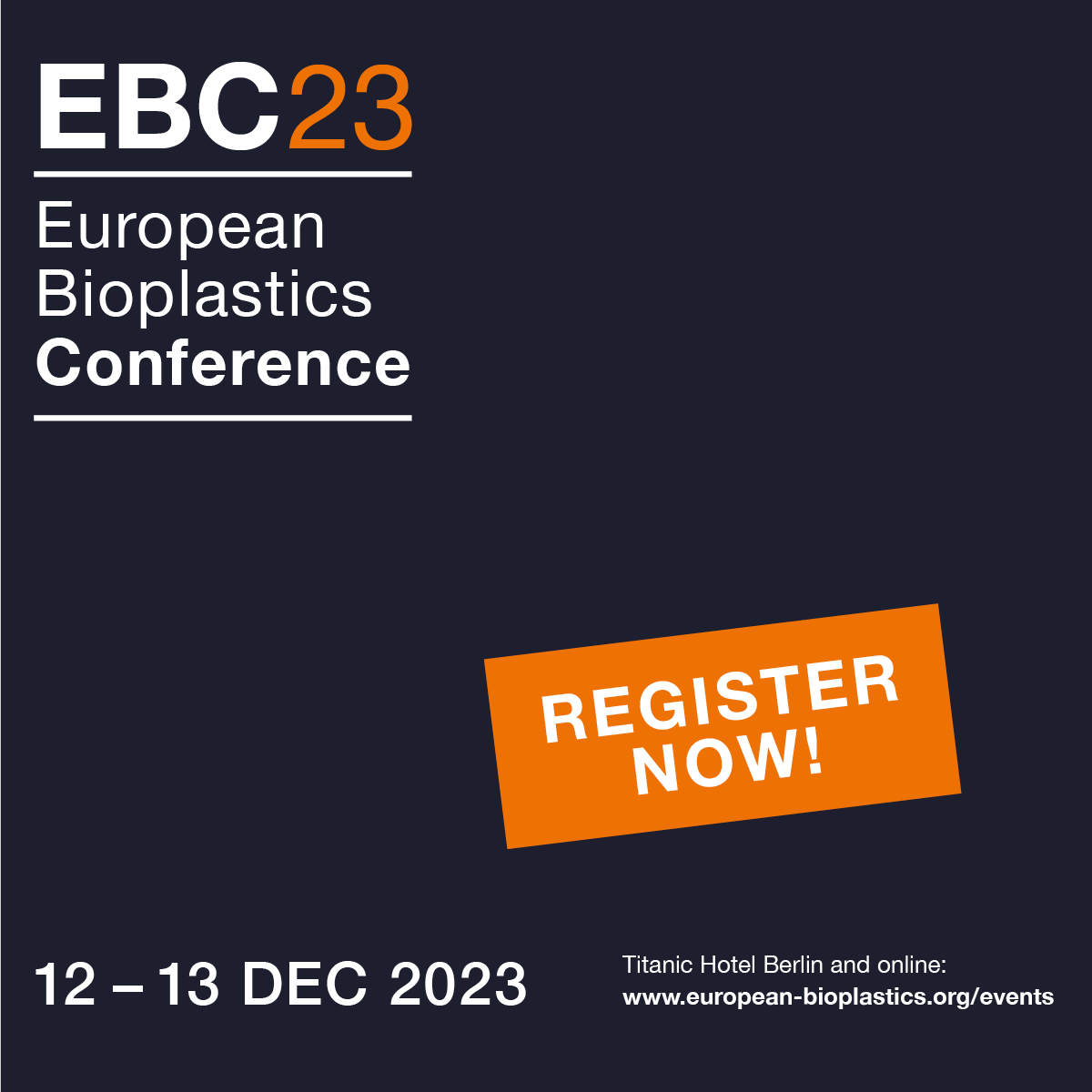
2023 European Bioplastic Conference will take place on 12-13 December 2023 in Berlin (Germany) and online.
The 2023 edition of the leading business and networking event for the bioplastics industry in Europe will showcase how biopolymers are driving innovation forward for more sustainability, resource efficiency, and functionality through engaging sessions and panel discussions.
Read and download the agenda:
https://www.european-bioplastics.org/events/ebc/programme/
The 2023 edition of the leading business and networking event for the bioplastics industry in Europe will showcase how biopolymers are driving innovation forward for more sustainability, resource efficiency, and functionality through engaging sessions and panel discussions.
Read and download the agenda:
https://www.european-bioplastics.org/events/ebc/programme/
Germany moves towards new ‘plastics tax’
Following in the footsteps of countries such as Spain and the United Kingdom, Germany is now also introducing a ‘plastics tax’ of its own. The German Single-Use Plastics Fund Act, which was passed in May 2023 and implements Article 8, 1-7 of the Single-use Plastics Directive into German law, created the legal basis for the implementation of the single-use plastic fund by the Federal Environment Agency, or UBA. To that end, the Bundestag passed the single-use plastic fund regulation yesterday evening.
The new regulation determines the levy rates and the payment system for the single-use plastic fund. Manufacturers of specified single-use plastic products will pay a levy into the fund to support the public sector in combating environmental waste. The UBA will administrate the fund and allocate the money to the municipalities. The UBA is currently developing the necessary databases to process the single-use plastic fund. The plastics tax will be introduced on 1 January 2024 and be payable for the first time in 2025.
Registration of manufacturers and beneficiaries is scheduled to start on January 1, 2024.
The new regulation determines the levy rates and the payment system for the single-use plastic fund. Manufacturers of specified single-use plastic products will pay a levy into the fund to support the public sector in combating environmental waste. The UBA will administrate the fund and allocate the money to the municipalities. The UBA is currently developing the necessary databases to process the single-use plastic fund. The plastics tax will be introduced on 1 January 2024 and be payable for the first time in 2025.
Registration of manufacturers and beneficiaries is scheduled to start on January 1, 2024.
The following taxes, based on calculations of the actual costs of clean-up, are due for each kilogram of products placed on the market:
The municipalities will receive payments from the fund in proportion to what they are entitled to under a carefully established and administrated points system. Both the tax rates and points system will be reviewed by the federal government every three years in accordance with legal requirements.
- Tobacco filter: 8.972 euros per kilogram
- To-go beverage cups: 1.236 euros per kilogram
- To-go food containers: 0.177 euros per kilogram
- Bags and foil packaging: 0.876 euros per kilogram
- Beverage containers without a deposit: 0.181 euros per kilogram
- Beverage containers with a deposit: 0.001 euros per kilogram
- Light plastic bags: 3.801 euros per kilogram
- Wet wipes: 0.061 euros per kilogram and
- Balloons: 4.340 euros per kilogram.
The municipalities will receive payments from the fund in proportion to what they are entitled to under a carefully established and administrated points system. Both the tax rates and points system will be reviewed by the federal government every three years in accordance with legal requirements.
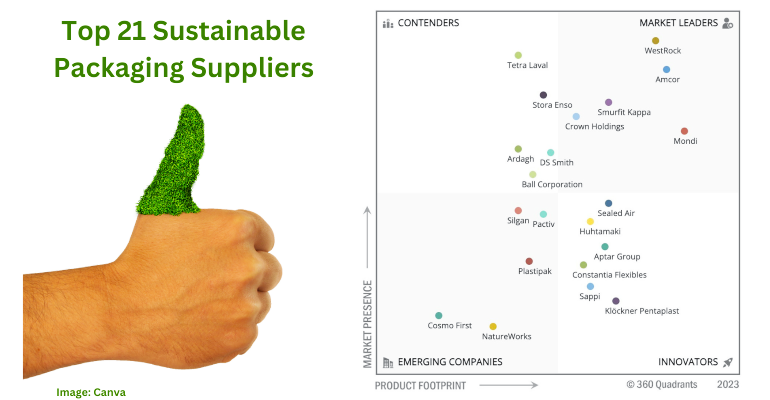
Top 21 Sustainable Packaging Suppliers Revealed
A comprehensive industry analysis from MarketsandMarkets, called the “Sustainable Packaging Companies Quadrant,” identifies 2023’s top 21 sustainable packaging companies worldwide.
The analysis provides a detailed evaluation of more than 80 market players, exploring technology advancements, product innovations, and emerging trends. Criteria for evaluating the companies’ product footprint included:
The analysis provides a detailed evaluation of more than 80 market players, exploring technology advancements, product innovations, and emerging trends. Criteria for evaluating the companies’ product footprint included:
- Packaging material (plastic, paper and paperboard, metal, glass).
- Process (recycled, reusable, degradable).
- Function (active, molded pulp, alternate fiber).
- Application (food and beverage, healthcare, personal care, etc.).
- Layer (primary, secondary, tertiary).
- Sustainable initiatives.
- Use of post-consumer recycled content.
The full list of leading sustainable packaging companies is shown below, in alphabetical order, with a packaging recap for each.
The five that ranked highest on a combination of market presence and product footprint are:
WestRock, Amcor, Smurfit Kappa, Crown Holdings, and Mondi.
The five that ranked highest on a combination of market presence and product footprint are:
WestRock, Amcor, Smurfit Kappa, Crown Holdings, and Mondi.
1. Amcor produces flexible and rigid plastic packaging, specialty cartons, and closures for companies in the food/beverage, pharmaceutical, medical, home, and personal-care categories.
2. AptarGroup supplies plastic closures and pumps for consumer goods packaging in categories such as personal care, beauty, home care, pharmaceuticals, and food and beverage.
3. Ardagh Group’s global operations include business segments for glass and metal packaging.
4. Ball Corp. supplies consumer goods companies in the beverage, food, and household products categories with aluminum packaging, including cans, bottles, and aerosol cans.
5. Constantia Flexibles supplies companies in the food, pet food, pharmaceutical, and beverage categories with flexible plastic packaging, aluminum lidding and packaging, paper-based packaging, and rigid plastic packaging.
6. The Cosmo Films business unit of Cosmo First supplies specialty films for flexible packaging, lamination, labeling, and industrial applications, with a specialization in biaxially oriented polypropylene (BOPP) films, cast polypropylene (CPP) films, and biaxially oriented polyethylene terephthalate (BOPET) films.
7. Crown Holdings focuses on metal packaging, with specialties in food, beverage, and aerosol packaging.
8. DS Smith supplies fiber-based packaging worldwide and is a Strategic Partner of the Ellen MacArthur Foundation.
9. Huhtamaki Group manufactures consumer and specialty packaging, with emphasis on flexible plastic packaging, molded-fiber packaging, release films, paper cups, and compostable tableware and packaging.
10. Klöckner Pentaplast produces rigid plastic films for processes such as thermoforming and form-fill-seal, as well as flexible packaging films.
11. Mondi supplies paper-based packaging and flexible plastic packaging materials and supplies; the latter include bags and pouches, release liners, and functional films.
12. NatureWorks is a supplier of biopolymers (notably polylactic acid) and uses renewable feedstocks such as corn, cassava, sugar cane, and beets to manufacture its products.
13. Pactiv supplies foodservice customers, food processors, food packers, supermarkets, and restaurants with food packaging made from rigid plastic, expanded polystyrene, polyethylene-coated board, paper, molded fiber, and aluminum.
14. Plastipak Packaging produces rigid plastic containers and is a leading North American blow-molder; its Clean Tech affiliate company recycles more than 200 million pounds of plastic per year.
15. Sappi manufactures paper packaging, paperboard products, containerboard products, label papers, silicone base papers, and flexible coated and uncoated packaging papers.
16. Sealed Air supplies flexible plastic packaging, including Bubble Wrap, foam cushioning, shrink bags and films, overwrap, and form-fill-seal films, plus plastic bottles, plastic food trays, and vacuum skin packaging products.
17. Silgan White Cap produces metal, composite, and plastic vacuum closures for foods and beverages; Silgan Plastics manufactures PET containers; and Silgan Containers produces metal food packaging.
18. Smurfit Kappa is a leading producer of paper-based packaging — including corrugated, solid board, folding carton, and tube packaging — for ecommerce, retail, consumer, and industrial applications.
19. Stora Enso produces paper- and wood-fiber-based packaging, including wood foam for cushioning, set-up boxes, paperboard packaging materials, and corrugated packaging solutions.
20. Tetra Laval’s Tetra Pak business unit sells aseptic carton packaging and processing equipment; the cartons are primarily paperboard, with barrier layers of polyethylene and aluminum foil.
21. WestRock provides paper- and pulp-based packaging, including corrugated containers, folding cartons, containerboard, paperboard, pulp, and kraft paper, as well as equipment.
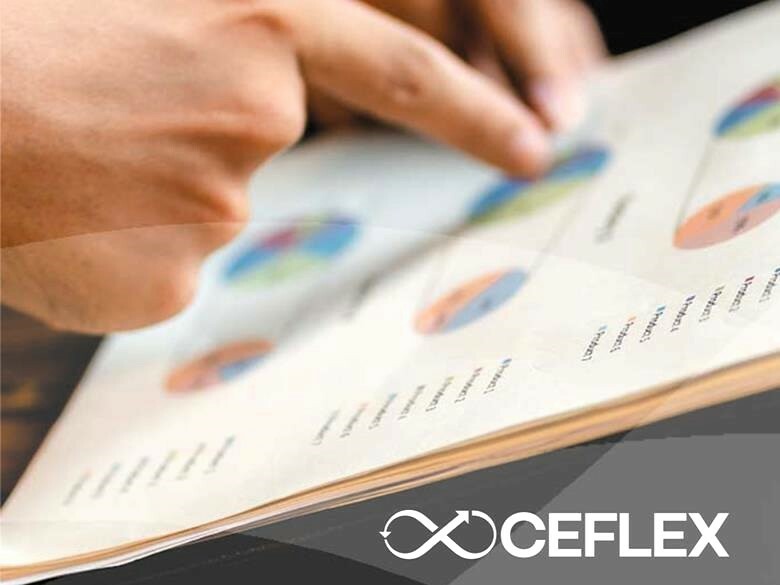
CEFLEX and Recyda have developed a new ‘Design Check’ tool to streamline collaboration between designers, technologists, customers, and suppliers of flexible packaging and drive the creation of sustainability-minded packaging.
CEFLEX’s ‘Designing for a Circular Economy’ (D4ACE) guidelines were launched in 2020, aiming to help companies optimise all flexible packaging for collection, sorting, and recycling and produce high quality recyclate.
Now design-check.ceflex.eu has been created as a free service to assess packaging portfolios and develop new products alongside partners, suppliers, and customers. It enables users to check whether a design or specification is suitable to their individual needs.
Tested and developed by a team of CEFLEX stakeholders, the tool is based on current D4ACE guidelines that cover mixed PO and mono-material PE and PP structures in a mechanical recycling process. Various stakeholders are said to have used it successfully.
“The tool can be used either to assess an existing package, facilitate the R&D and design process, engage with other parts of the value chain, or prepare for recyclability testing,” said CEFLEX design lead Liz Morrish. “Assessment covers all parts of the guidelines, including their sortability and recyclability principles. It indicates if a specification or design is compatible, has limited compatibility or is not compatible in terms of the D4ACE categories. Users are also able to undertake assessments for multiple specifications or designs.”
In other news, the Confederation of Paper Industries (CPI) has developed Papercycle, an online recyclability assessment and certification tool for fiber-based packaging materials and products seeking to help producers gauge the recyclability of their packaging in line with upcoming legislation.
Meanwhile, the 4evergreen alliance has released the beta version of its Fibre-Based Packaging Recyclability Evaluation protocol. The tool hopes to create an improved and standardized framework for evaluating the recyclability of packaging products in Europe.
Now design-check.ceflex.eu has been created as a free service to assess packaging portfolios and develop new products alongside partners, suppliers, and customers. It enables users to check whether a design or specification is suitable to their individual needs.
Tested and developed by a team of CEFLEX stakeholders, the tool is based on current D4ACE guidelines that cover mixed PO and mono-material PE and PP structures in a mechanical recycling process. Various stakeholders are said to have used it successfully.
“The tool can be used either to assess an existing package, facilitate the R&D and design process, engage with other parts of the value chain, or prepare for recyclability testing,” said CEFLEX design lead Liz Morrish. “Assessment covers all parts of the guidelines, including their sortability and recyclability principles. It indicates if a specification or design is compatible, has limited compatibility or is not compatible in terms of the D4ACE categories. Users are also able to undertake assessments for multiple specifications or designs.”
In other news, the Confederation of Paper Industries (CPI) has developed Papercycle, an online recyclability assessment and certification tool for fiber-based packaging materials and products seeking to help producers gauge the recyclability of their packaging in line with upcoming legislation.
Meanwhile, the 4evergreen alliance has released the beta version of its Fibre-Based Packaging Recyclability Evaluation protocol. The tool hopes to create an improved and standardized framework for evaluating the recyclability of packaging products in Europe.
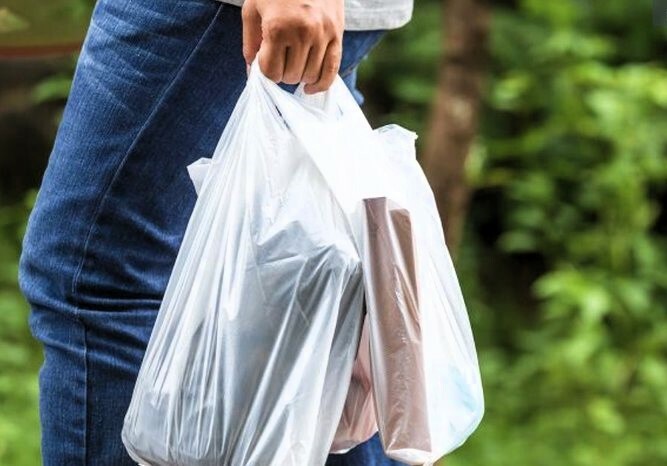
Sweden to Repeal Plastic Bag Tax
Consumption of thin-plastic carrier bags is well below the EU target, so the Swedish government has decided to abolish the tax starting next year.
The 3 kroner (28-cent) tax was introduced in 2020 to encourage Swedish shoppers to reduce their use of thin-plastic carrier bags and align consumption with the European Union target of 40 bags per person per year. It accomplished that and more: In the last two years, consumption in Sweden has dipped below 20 plastic carrier bags per person annually, according to the sweden.postsen.com website, which carries news about Sweden in English.
In 2019, the year before the plastic bag tax was introduced, Swedes were using 74 plastic carrier bags per person, reports EuroNews, citing statistics from Sweden’s Environmental Protection Agency. By 2022, that number had dropped to 17 plastic bags per year.
Given that the EU consumption target will be achieved with or without a tax on plastic carrier bags, the government proposes to abolish the tax on Nov. 1, 2024. The government made it official with an announcement on Sept. 13.
The 3 kroner (28-cent) tax was introduced in 2020 to encourage Swedish shoppers to reduce their use of thin-plastic carrier bags and align consumption with the European Union target of 40 bags per person per year. It accomplished that and more: In the last two years, consumption in Sweden has dipped below 20 plastic carrier bags per person annually, according to the sweden.postsen.com website, which carries news about Sweden in English.
In 2019, the year before the plastic bag tax was introduced, Swedes were using 74 plastic carrier bags per person, reports EuroNews, citing statistics from Sweden’s Environmental Protection Agency. By 2022, that number had dropped to 17 plastic bags per year.
Given that the EU consumption target will be achieved with or without a tax on plastic carrier bags, the government proposes to abolish the tax on Nov. 1, 2024. The government made it official with an announcement on Sept. 13.
Join "Vegan & Eco" group on LinkedIn:
https://www.linkedin.com/groups/9081194/
https://www.linkedin.com/groups/9081194/
Subscribe to my monthly newsletter:
www.velana.net
www.velana.net

